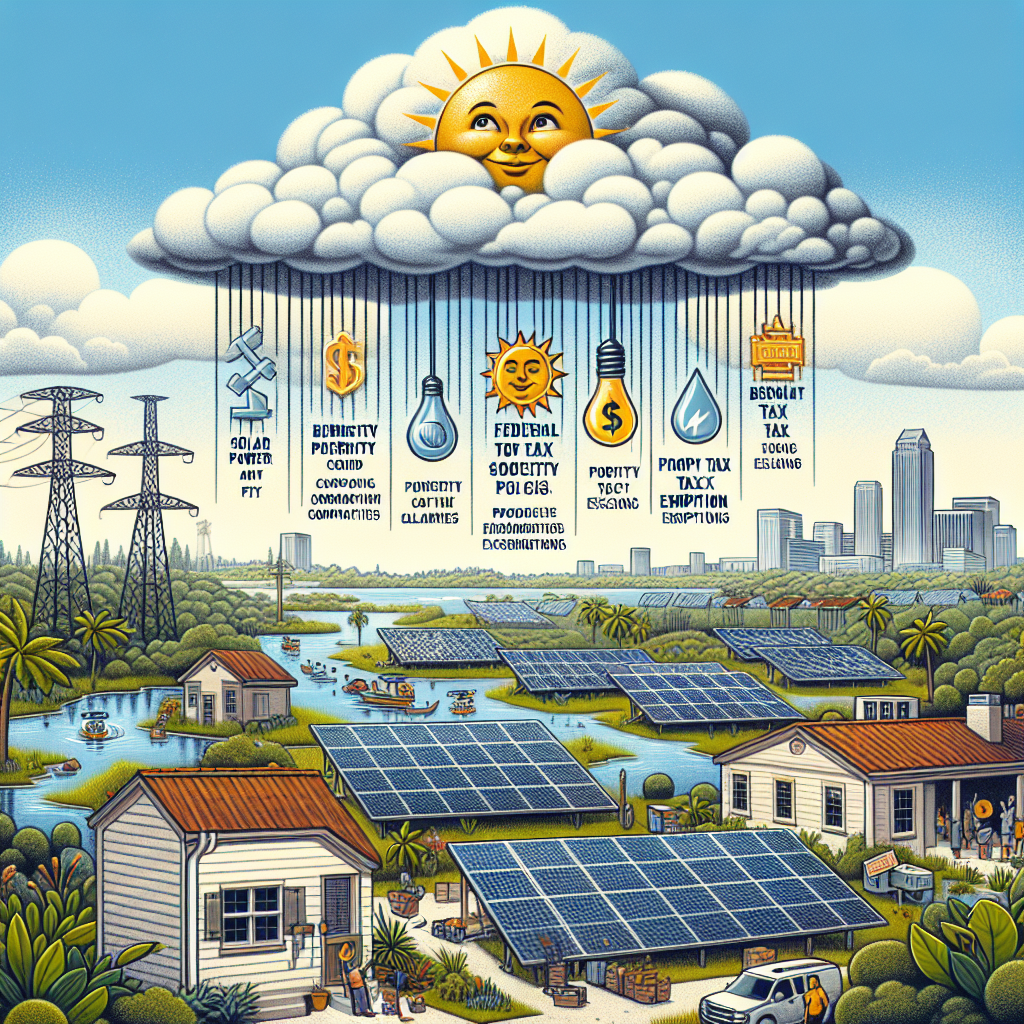
The Sunshine State’s Golden Opportunity: Florida Solar Incentives
Florida, the Sunshine State, is living up to its name in a transformative way. Amid growing awareness of environmental sustainability and pressing concerns over climate change, Florida is increasingly recognizing the value of solar energy. A strategic approach to incentivize solar power adoption is significantly altering the landscape, making it more appealing for residents and businesses to go green.
Understanding the Need for Solar Energy in Florida
Florida basks in abundant sunshine year-round, making solar energy an ideal resource. Yet, for a long time, its solar efforts lagged behind other states. In recent years, though, there's been a seismic shift. The state government, along with various stakeholders, has prioritized solar incentives to encourage widespread adoption. This transition isn't just about saving money; it's a commitment to a sustainable future.
Solar panels and other renewable energy solutions are now popping up on rooftops and fields across Florida. The sunny climate provides an excellent environment for solar power generation, diminishing reliance on non-renewable energy sources. The push towards cleaner energy is gaining momentum, thanks to robust incentives that make solar investments financially viable.
Overview of Florida's Solar Incentives
Florida's solar incentives comprise several layers, from state-sponsored rebates to federal tax credits. These incentives play a crucial role in diminishing the upfront costs associated with solar energy systems. They also make solar energy a more attractive and accessible option for diverse income brackets.
Federal Solar Investment Tax Credit (ITC)
At the federal level, the Solar Investment Tax Credit (ITC) stands as a significant incentive. This tax credit allows homeowners and businesses to deduct a portion of their solar installation costs from federal taxes. The ITC has fueled a surge in solar installations across the country, including Florida. Initially set at 30%, this credit is gradually stepping down but continues to be a pivotal factor in the solar adoption equation.
Florida's Net Metering Policy
Perhaps the jewel in Florida's solar crown is its Net Metering policy. Net Metering permits homeowners with solar panels to sell excess electricity back to the grid. This system ensures that solar energy producers only pay for their net energy consumption. When your panels generate more power than needed, that energy flows back into the grid, earning you credits on your electricity bill.
Net Metering motivates homeowners to opt for solar installations, knowing that their investment can lead to long-term financial gains. Companies like Duke Energy Florida and Florida Power & Light (FPL) are integral to this initiative, providing a seamless and encouraging framework for solar energy credits.
Property Tax Exemptions
Florida also offers property tax exemptions for renewable energy devices. Homes equipped with solar panels receive an exemption, meaning homeowners won’t pay additional property taxes on the added value of the solar system. This exemption is pivotal, as it assures homeowners that their investments won’t lead to soaring property taxes, thus offsetting some of the initial installation costs.
Sales Tax Exemptions
In a forward-thinking move, Florida has implemented a sales tax exemption for solar energy systems. Components like solar panels, inverters, and batteries are free from the state’s sales tax, slashing the initial expenditure by 6%. This tax relief further diminishes the economic barrier to adopting solar solutions.
Performance-Based Incentives (PBIs)
While less common, Performance-Based Incentives (PBIs) are also part of Florida’s solar incentives mix. PBIs reward solar energy producers based on the actual energy generated over time. It's an ongoing financial reward scheme that motivates maintaining efficient performing systems.
Key Drivers of Adoption: Utilities and Policies
Florida’s proactive stance on solar energy has received massive boosts from both utilities and evolving policies. State utility companies are leading the charge, investing in large-scale solar farms and encouraging residential solar installations. Their programs have significantly contributed to making solar an integral part of Florida's energy future.
Florida Power & Light (FPL)
Florida Power & Light remains a frontrunner in the state’s solar revolution. With notable projects such as the Manatee Energy Storage Center—soon to be the world’s largest solar-powered battery system—FPL is steering Florida towards a cleaner, more sustainable energy future. The utility plans to install 30 million solar panels by 2030, a remarkable commitment that underscores its role in the state's solar expansion.
Duke Energy Florida
Duke Energy Florida has also been instrumental in shoring up solar energy adoption. The company provides lucrative rebates to its customers who opt for solar installations, making renewable energy a prudent choice. These rebates, combined with state and federal incentives, drastically reduce the net cost of adopting solar energy.
Financing Options: Making Solar More Accessible
One of the significant hurdles in adopting solar energy is the upfront cost. Recognizing this, Florida has formulated several financing options that ease the financial burden, making solar installations more feasible for a broader audience.
Solar Loans
Many Floridian banks and credit unions offer solar loans tailored to fund residential and commercial solar installations. These loans come with competitive interest rates and flexible terms, ensuring manageable repayment schedules. Programs like Property Assessed Clean Energy (PACE) financing provide another pathway by allowing homeowners to finance solar installations through property assessments, repaid via property tax bills.
Leasing and Power Purchase Agreements (PPAs)
Solar leasing and Power Purchase Agreements (PPAs) present alternatives for those who prefer not to purchase solar systems outright. These arrangements involve third-party ownership where residents or businesses lease the solar equipment or purchase the electricity generated at a set rate. Such models reduce the entry-level investment, enabling immediate savings on energy bills without bearing the initial cost.
Community Solar Programs
Community solar programs are burgeoning across Florida, providing an inclusive approach to solar energy adoption. These programs allow individuals to buy a share in a solar project, enjoying the benefits without installing panels on their property. It’s a particularly advantageous model for renters, condo owners, and those with unsuitable roofs.
Solar Co-ops
Solar co-ops are another innovative solution flourishing in Florida. These cooperatives aggregate the buying power of a community to negotiate reduced prices for solar installations. By joining a solar co-op, residents can significantly cut down installation costs, making the investment even more attractive.
Future Prospects and Legislative Support
Florida’s legislative environment is increasingly supportive of solar energy initiatives. Continuous advocacy and legislative efforts are expected to further smooth the path toward renewable energy adoption. Legislators are working on comprehensive energy policies aimed at improving grid infrastructure, supporting technological advancements, and fostering an environment conducive to solar expansion.
The Role of Advocacy Groups
Advocacy groups like the Southern Alliance for Clean Energy (SACE) and Solar United Neighbors play a vital role in advancing solar policies. Their efforts include lobbying for favorable laws, educating the public, and organizing community efforts that connect residents with solar opportunities.
Upcoming Legislation
Future legislative measures are likely to focus on enhancing the state’s renewable energy portfolio and providing further financial incentives. Anticipated policies may include expanded tax credits, additional rebates, and further refinements to Net Metering protocols.
Florida's aggressive push towards solar energy is multifaceted, incorporating financial incentives, supportive policies, legislative advocacy, and robust participation from utility companies. The confluence of these elements positions Florida not just as the Sunshine State figuratively, but also as a beacon of sustainable energy practices. The journey is ongoing, and as solar technologies evolve and become more affordable, Florida's solar landscape is poised to grow even brighter, fostering an environment where clean energy is not just a luxury but a staple of daily life.



